美国纽约大学介绍演讲PPT
- 格式:pptx
- 大小:443.25 KB
- 文档页数:7
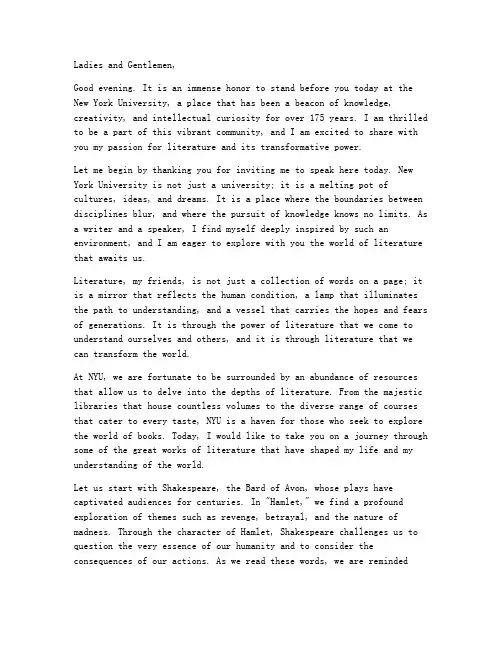
Ladies and Gentlemen,Good evening. It is an immense honor to stand before you today at the New York University, a place that has been a beacon of knowledge, creativity, and intellectual curiosity for over 175 years. I am thrilled to be a part of this vibrant community, and I am excited to share with you my passion for literature and its transformative power.Let me begin by thanking you for inviting me to speak here today. New York University is not just a university; it is a melting pot of cultures, ideas, and dreams. It is a place where the boundaries between disciplines blur, and where the pursuit of knowledge knows no limits. As a writer and a speaker, I find myself deeply inspired by such an environment, and I am eager to explore with you the world of literature that awaits us.Literature, my friends, is not just a collection of words on a page; it is a mirror that reflects the human condition, a lamp that illuminates the path to understanding, and a vessel that carries the hopes and fears of generations. It is through the power of literature that we come to understand ourselves and others, and it is through literature that we can transform the world.At NYU, we are fortunate to be surrounded by an abundance of resources that allow us to delve into the depths of literature. From the majestic libraries that house countless volumes to the diverse range of courses that cater to every taste, NYU is a haven for those who seek to explore the world of books. Today, I would like to take you on a journey through some of the great works of literature that have shaped my life and my understanding of the world.Let us start with Shakespeare, the Bard of Avon, whose plays have captivated audiences for centuries. In "Hamlet," we find a profound exploration of themes such as revenge, betrayal, and the nature of madness. Through the character of Hamlet, Shakespeare challenges us to question the very essence of our humanity and to consider the consequences of our actions. As we read these words, we are remindedthat literature has the power to provoke deep introspection and to make us question our own beliefs and values.Moving forward in time, we come across the works of Jane Austen, a master of social commentary. In "Pride and Prejudice," Austen crafts a story that is both a romantic comedy and a biting critique of theBritish class system. Through the characters of Elizabeth Bennet and Mr. Darcy, we learn about the importance of self-awareness, the dangers of pride, and the joy of finding true love. Austen's wit and wisdom continue to resonate with readers today, reminding us that literature has the power to entertain and to educate.As we traverse the annals of time, we cannot overlook the works of Franz Kafka, a writer whose works are often described as existentialist and surreal. In "The Trial," Kafka presents us with a man who is trapped in a Kafkaesque world where absurdity and injustice reign supreme. Through this story, Kafka challenges us to confront the absurdity of our own lives and to seek meaning in a world that often seems senseless. Kafka's work serves as a reminder that literature can be a catalyst for profound self-reflection and personal growth.In the 20th century, we find ourselves in the midst of a literary explosion, with authors from around the world contributing their voices to the global conversation. One such voice is that of Gabriel GarcíaMárquez, the Colombian author whose "One Hundred Years of Solitude" is a masterful exploration of the Latin American experience. Through the magical realism of his narrative, Márquez invites us to consider the complexities of history, the interconnectedness of lives, and the power of love. Márquez's work teaches us that literature can be a bridge between cultures, fostering empathy and understanding.As we continue our journey through literature, we cannot forget the American author Harper Lee, whose "To Kill a Mockingbird" is a timeless classic that tackles the issue of racial injustice. Through the eyes of Scout Finch, we witness the trials and tribulations of a young girl growing up in the racially charged atmosphere of the American South.Lee's novel serves as a powerful reminder of the importance of moral courage, the need for empathy, and the unyielding quest for justice.Now, let us take a moment to reflect on the contemporary landscape of literature. Today, we are witness to a literary renaissance, with authors from diverse backgrounds and cultures contributing their unique perspectives to the global discourse. Whether it is the dystopian worlds of Neil Gaiman or the raw, emotional storytelling of Elena Ferrante, contemporary literature continues to push the boundaries of what we consider possible, challenging us to think critically and to embrace the complexity of our world.As we delve into the pages of these works, we must remember that literature is not just a source of entertainment or enlightenment; it is a powerful tool for social change. It is through literature that we can foster empathy, challenge our preconceptions, and inspire action. The words we read have the power to ignite a spark within us, to motivate us to stand up for what is right, and to fight against injustice.Here at NYU, we are part of a community that values the power of words. We are a community that recognizes the transformative potential of literature, and we are committed to nurturing that potential within ourselves and within others. As you continue your academic journey, I urge you to embrace the beauty and complexity of literature. Let it be your companion on the road to self-discovery, let it be your guide on the path to understanding, and let it be your inspiration to make a difference in the world.In closing, I would like to leave you with a quote from C.S. Lewis, a20th-century writer and scholar: "We read to know we are not alone." As you engage with literature, remember that you are part of a grand conversation that spans centuries and cultures. Your voice, your thoughts, and your experiences are invaluable contributions to this conversation. Embrace the power of words, and let them carry you to new heights of understanding and creativity.Thank you for listening, and may your journey through literature be as enriching and transformative as mine has been.Godspeed.[Applause]。
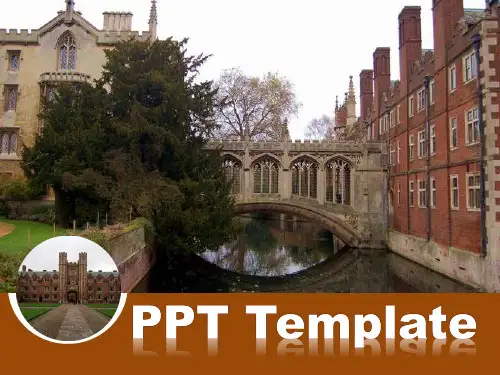
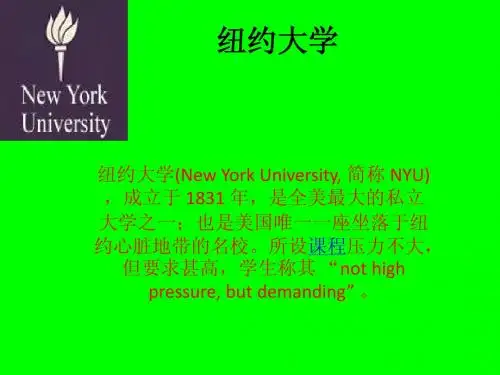
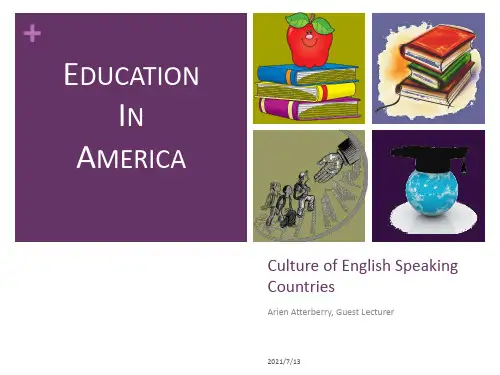

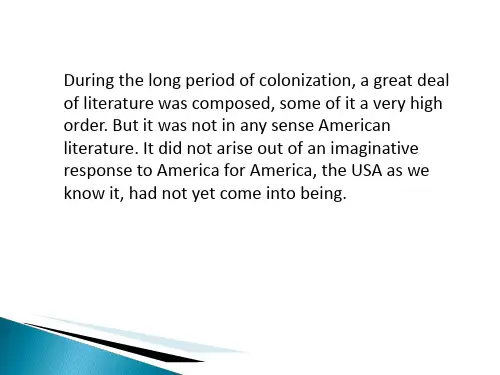
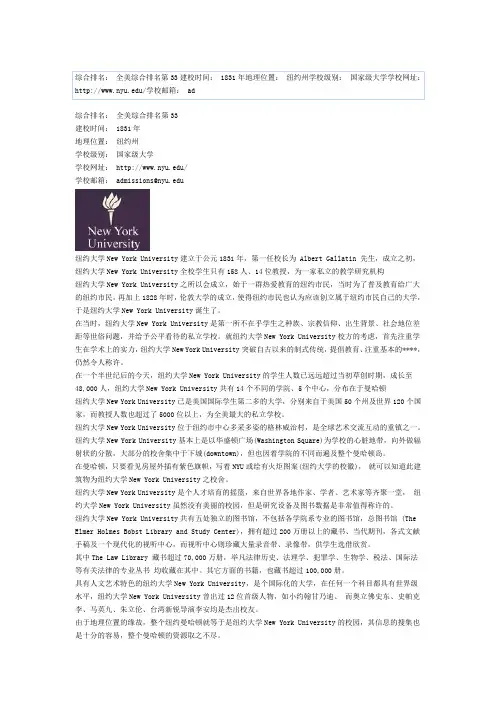
综合排名:全美综合排名第33建校时间: 1831年地理位置:纽约州学校级别:国家级大学学校网址: /学校邮箱: admissions@纽约大学New York University建立于公元1831年,第一任校长为 Albert Gallatin 先生,成立之初,纽约大学New York University全校学生只有158人、14位教授,为一家私立的教学研究机构纽约大学New York University之所以会成立,始于一群热爱教育的纽约市民,当时为了普及教育给广大的纽约市民,再加上1828年时,伦敦大学的成立,使得纽约市民也认为应该创立属于纽约市民自己的大学,于是纽约大学New York University诞生了。
在当时,纽约大学New York University是第一所不在乎学生之种族、宗教信仰、出生背景、社会地位差距等世俗问题,并给予公平看待的私立学校。
就纽约大学New York University校方的考虑,首先注重学生在学术上的实力,纽约大学New York University突破自古以来的制式传统,提倡教育、注重基本的****,仍然令人称许。
在一个半世纪后的今天,纽约大学New York University的学生人数已远远超过当初草创时期,成长至48,000人,纽约大学New York University共有14个不同的学院、5个中心,分布在于曼哈顿纽约大学New York University已是美国国际学生第二多的大学,分别来自于美国50个州及世界120个国家,而教授人数也超过了5000位以上,为全美最大的私立学校。
纽约大学New York University位于纽约市中心多采多姿的格林威治村,是全球艺术交流互动的重镇之一。
纽约大学New York University基本上是以华盛顿广场(Washington Square)为学校的心脏地带,向外做辐射状的分散,大部分的校舍集中于下城(downtown),但也因着学院的不同而遍及整个曼哈顿岛。
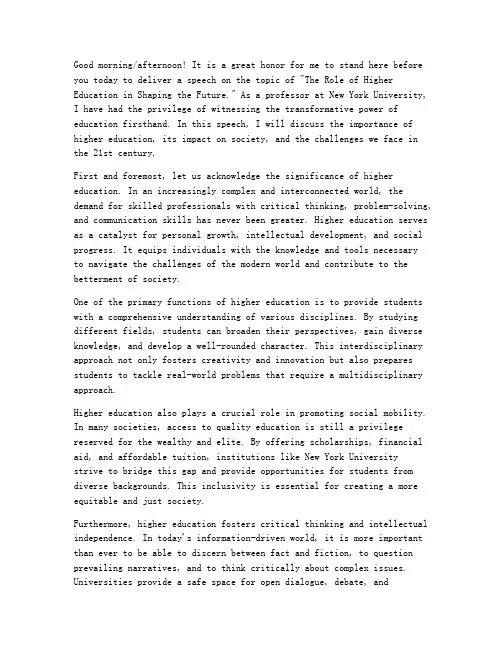
Good morning/afternoon! It is a great honor for me to stand here before you today to deliver a speech on the topic of "The Role of Higher Education in Shaping the Future." As a professor at New York University, I have had the privilege of witnessing the transformative power of education firsthand. In this speech, I will discuss the importance of higher education, its impact on society, and the challenges we face in the 21st century.First and foremost, let us acknowledge the significance of higher education. In an increasingly complex and interconnected world, the demand for skilled professionals with critical thinking, problem-solving, and communication skills has never been greater. Higher education serves as a catalyst for personal growth, intellectual development, and social progress. It equips individuals with the knowledge and tools necessaryto navigate the challenges of the modern world and contribute to the betterment of society.One of the primary functions of higher education is to provide students with a comprehensive understanding of various disciplines. By studying different fields, students can broaden their perspectives, gain diverse knowledge, and develop a well-rounded character. This interdisciplinary approach not only fosters creativity and innovation but also prepares students to tackle real-world problems that require a multidisciplinary approach.Higher education also plays a crucial role in promoting social mobility. In many societies, access to quality education is still a privilege reserved for the wealthy and elite. By offering scholarships, financial aid, and affordable tuition, institutions like New York Universitystrive to bridge this gap and provide opportunities for students from diverse backgrounds. This inclusivity is essential for creating a more equitable and just society.Furthermore, higher education fosters critical thinking and intellectual independence. In today's information-driven world, it is more important than ever to be able to discern between fact and fiction, to question prevailing narratives, and to think critically about complex issues. Universities provide a safe space for open dialogue, debate, andintellectual exploration, where students can challenge their own beliefs and expand their horizons.The impact of higher education extends beyond the individual level and reaches into the fabric of society. Educated individuals tend to have higher earning potential, which contributes to economic growth and development. Moreover, they are more likely to engage in civic activities, volunteer, and contribute to the welfare of their communities. This, in turn, strengthens social cohesion and fosters a more inclusive and compassionate society.However, the 21st century presents numerous challenges to the role of higher education. One of the most pressing issues is the rising cost of tuition, which has become a burden for many students and their families. This has led to an increase in student debt and has raised concerns about the accessibility of higher education. As educators, we muststrive to find innovative solutions to make quality education more affordable and accessible to all.Another challenge is the rapid pace of technological advancement, which has the potential to disrupt traditional educational models. Online learning, MOOCs (Massive Open Online Courses), and other digital tools have revolutionized the way we acquire knowledge. While these technologies offer unprecedented opportunities for learning, they also raise questions about the role of professors, the value of face-to-face interactions, and the future of higher education institutions.Furthermore, we must address the issue of global competition. As the world becomes more interconnected, students need to be prepared to compete on an international level. This requires institutions to focus on developing global citizens who are proficient in multiple languages, have a deep understanding of different cultures, and are adaptable to diverse environments.In conclusion, the role of higher education in shaping the future cannot be overstated. It is an indispensable tool for personal growth, social progress, and economic development. As we face the challenges of the21st century, we must work together to ensure that higher education remains accessible, affordable, and relevant to the needs of society.To achieve this, we must prioritize the following:1. Advocating for policies that make higher education more affordable and accessible.2. Investing in technology and digital tools to enhance the learning experience.3. Fostering interdisciplinary collaboration and promoting global perspectives.4. Preparing students for the challenges of the future by equipping them with critical thinking, problem-solving, and communication skills.5. Encouraging active participation in civic activities and community service.By addressing these challenges and embracing the opportunities that lie ahead, we can ensure that higher education continues to be a force for good in the world. Together, we can shape a future where knowledge, innovation, and compassion thrive.Thank you for your attention, and I welcome your questions and comments.。
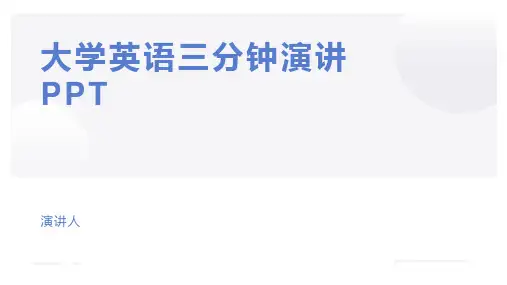
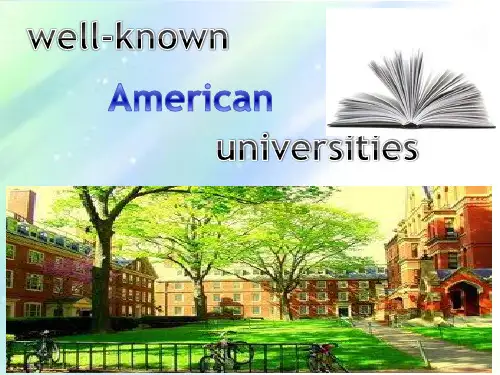
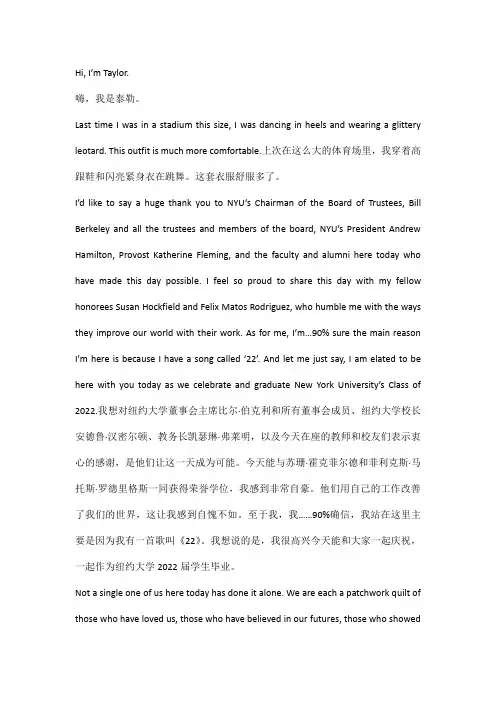
Hi, I’m Taylor.嗨,我是泰勒。
Last time I was in a stadium this size, I was dancing in heels and wearing a glittery leotard. This outfit is much more comfortable.上次在这么大的体育场里,我穿着高跟鞋和闪亮紧身衣在跳舞。
这套衣服舒服多了。
I’d like to say a huge thank you to NYU‘s Chairman of the Board of Trustees, Bill Berkeley and all the trustees and members of the board, NYU’s President Andrew Hamilton, Provost Katherine Fleming, and the faculty and alumni here today who have made this day possible. I feel so proud to share this day with my fellow honorees Susan Hockfield and Felix Matos Rodriguez, who humble me with the ways they improve our world with their work. As for me, I’m…90% sure the main reason I’m here is because I have a song called ‘22’. And let me just say, I am elated to be here with you today as we celebrate and graduate New York University’s Class of 2022.我想对纽约大学董事会主席比尔·伯克利和所有董事会成员、纽约大学校长安德鲁·汉密尔顿、教务长凯瑟琳·弗莱明,以及今天在座的教师和校友们表示衷心的感谢,是他们让这一天成为可能。
Hi, I’m Taylor.嗨,我是泰勒。
Last time I was in a stadium this size, I was dancing in heels and wearing a glittery leotard. This outfit is much more comfortable.上次在这么大的体育场里,我还是穿着高跟鞋和闪亮的紧身衣跳舞。
这套衣服要舒服多了。
I’d like to say a huge thank you to NYU‘s Chairman of the Board of Trustees, Bill Berkeley and all the trustees and members of the board, NYU’s President Andrew Hamilton, Provost Katherine Fleming, and the faculty and alumni here today who have made this day possible. I feel so proud to share this day with my fellow honorees Susan Hockfield and Felix Matos Rodriguez, who humble me with the ways they improve our world with their work. As for me, I’m…90% sure the main reason I’m here is because I have a song called ‘22.’And let me just say, I am elated to be here with you today as we celebrate and graduate New York University’s Class of 2022.我想对纽约大学董事会主席比尔-伯克利和所有董事会成员、纽约大学校长安德鲁-汉密尔顿、教务长凯瑟琳-弗莱明,以及今天在座的教师和校友们表示衷心的感谢,是他们让这一天成为可能。